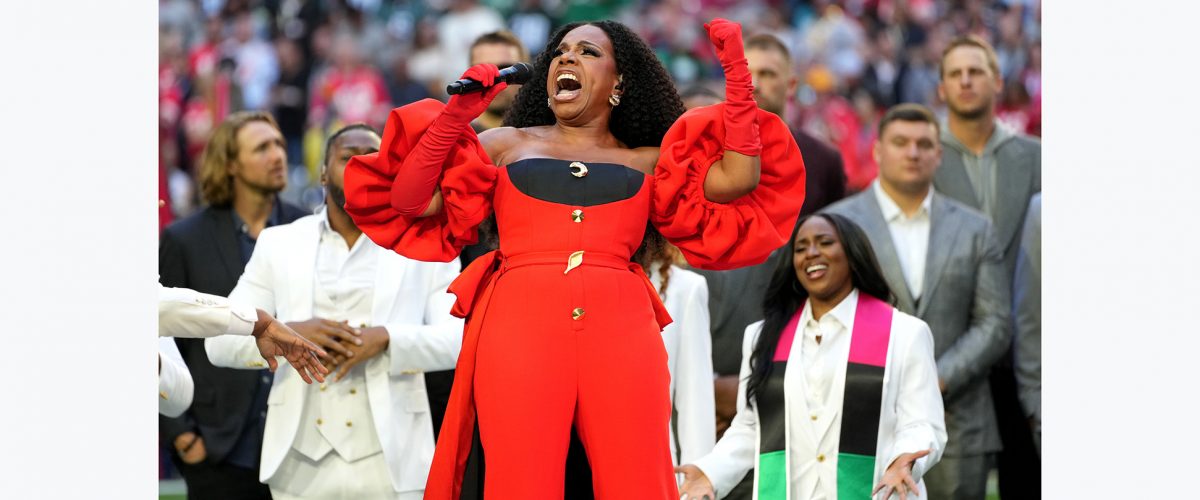I had an interesting conversation yesterday with the Washington Post’s Jennifer Rubin about the breathless objections by Rep. Lauren Boebert, R-Colo., and Rep. Marjorie Taylor Greene, R-Ga., to a pre-Super Bowl performance of “Lift Every Voice and Sing,” a song informally known for more than a century as the Black National Anthem.
If you didn’t tune in to Sunday’s Super Bowl early (or at all), you missed a moving performance of the song by Tony and Emmy award winner Sheryl Lee Ralph. It was performed just prior to the singing of “The Star-Spangled Banner” by Grammy award winner and country music star Chris Stapleton. If you didn’t catch it, I invite you to watch it here.
Following the performances, a predictable duo took to social media to accuse the NFL of trying to divide the country:
- Boebert tweeted: “America only has ONE NATIONAL ANTHEM. Why is the NFL trying to divide us by playing multiple!? Do football, not wokeness.”
- Greene tweeted: “Chris Stapleton just sang the most beautiful national anthem at the Super Bowl. But we could have gone without the rest of the wokeness.”

Robert P. Jones (Photo by Noah Willman)
It is easy to dismiss these antics — a fully in-character straining duet — with an eye roll. But the Super Bowl is a major cultural event, and as I reflected on my conversation with Rubin, I realized examining this conflict more deeply would be fruitful.
The most interesting question for me, as someone who studies religion, culture and politics, was this: How does the setting of “Lift Every Voice and Sing” alongside “The Star-Spangled Banner” change the performance of what it means to be an American?
First, some context. Sunday’s performance was not something new for the NFL. As Rubin notes in her column, over the last few years, the NFL has made efforts to be more openly supportive of racial equality and justice, especially given its own prior missteps in this area.
The NFL has tried to address these concerns in ways big and small. Playing “Lift Every Voice and Sing,” which has become associated with the Civil Rights movement, before some games has been part of that effort. After the murder of George Floyd in 2020, the league directed the song be played before every game on Opening Day. And again in 2021, the NFL announced that, in conjunction with its efforts to combat racial injustice, it would play the song at all “tentpole” events, such as playoff games.
“The two songs evoke strikingly different moods and modes of being American: one rooted in the struggle for freedom for all, the other in the American expansion into lands held by others.”
At the heart of the conflict is this juxtaposition, which played out on one of the nation’s largest cultural stages. The two songs evoke strikingly different moods and modes of being American: one rooted in the struggle for freedom for all, the other in the American expansion into lands held by others.
“Lift Every Voice and Sing” was written by James Weldon Johnson in 1900. It was written during a tumultuous time for African Americans, when the opening decades of the 20th century were marked by a revival of the KKK, lynchings and the passage of Jim Crow laws codifying segregation across the country. Originally written as a poem celebrating the birthday of Abraham Lincoln, it soon was set to music by James’ brother.
It was claimed by the NAACP as its official song in 1919, the year before Johnson become the organization’s executive secretary. It became informally known as the Black National Anthem over time and was regularly sung at civil rights meetings and marches. Joseph Lowery quoted the lyrics at President Barack Obama’s inauguration in 2009.
Although most Americans don’t realize it, while “The Star-Spangled Banner” was penned by Francis Scott Key in 1814, it was not adopted as the official National Anthem until more than a century later in 1931. Other songs such as “Hail Columbia,” “My Country ’Tis of Thee,” and “America the Beautiful” all served as unofficial national anthems in the 19th and early 20th centuries.
As many early objectors to the adoption of “The Star-Spangled Banner” as the official National Anthem noted, it is bellicose. Its origins lie in the War of 1812, a conflict with the British principally over continued westward expansion of the U.S. into Native American lands claimed by England. While the Revolutionary War was about colonial independence, this second war was a contest for the rights to occupy indigenous lands and control indigenous bodies.
At root, “The Star-Spangled Banner” is an anthem of assertive innocence, divine favoritism and unbridled triumphalism. And although we mostly sing the first stanza, the final lines of the fourth and final stanza reveal its animating spirit:
Then conquer we must, when our cause it is just.
And this be our motto — “In God is our trust.”
And the star-spangled banner in triumph shall wave
O’er the land of the free and the home of the brave.
At the time Key wrote these words, the “land of the free” had enslaved 86% of its 1.4 million African American residents (see 1810 U.S. Census). In the names of God and justice, the nation also was preparing to launch a brutal “Indian removal” policy that would result in the forced migration of more than 100,000 indigenous people and the estimated deaths of more than 15,000 — mostly the elderly, women and children — along what became known as the Trail of Tears. Placing the anthem in its historical context strains its principles to the breaking point.
“Placing the anthem in its historical context strains its principles to the breaking point.”
With its contrasting origins, “Lift Every Voice and Sing” (full lyrics here) is patriotic and hopeful about an American future, but it does not trade in American myths of white Christian chosen-ness or innocence. This line pair, for example, is anathema to those whose only vision of America is of a nation that cannot, by definition, do wrong:
Sing a song full of the faith that the dark past has taught us.
Sing a song full of the hope that the present has brought us.
More than seeing “Lift Every Voice and Sing” as a competing national anthem, it is opposition to this more sober, honest vision of America — a journey toward an unrealized future rather than a defense of an innocent past — that is behind the visceral reactions by Boebert, Greene and their ilk. Its clarion call to humility and equality exposes the hubris and violence that typically escapes scrutiny in our official anthem.
One final thought which deserves more space than I can give it here. It has always puzzled me that conservative white Christians, given our dismal history on slavery and segregation, can so easily use the words “woke” or “wokeness” pejoratively.
Over and over, Jesus and other writers of the New Testament implore Christians to be “born again,” a metaphor that implies a paradigm shift in the way one sees the world. The very act of baptism, particularly the immersive version practiced by Baptists and many other evangelicals, represents dying to the old and arising to a new way of living.
One of the earliest Bible verses I was instructed to memorize as a kid was the Apostle Paul’s command to Christians, “Be not conformed to this world: but be ye transformed by the renewing of your mind, that ye may prove what is that good, and acceptable and perfect will of God.” Just one chapter later in Romans, Paul also had this to say: “And that, knowing the time, that now it is high time to awake out of sleep: for now is our salvation nearer than when we believed.”
Each of these commands assumes that, caught as we are in our arrogance and stubbornness and sinfulness, we may yet not see things rightly. “Waking up” is an apt, even biblical, metaphor for understanding what Christian formation is about.
Christians who arrogantly reject this possibility — especially those of us who are white and shaped by traditions that supported slavery and segregation — are not only failing to learn the hard lessons of our troubling history; we are also shutting ourselves off from the possibility of change.
In theological terms, knee-jerk rejections of “wokeness” risk hardening our hearts and quenching the ongoing work of the Spirit, which blows where it wishes. Such a posture is the very antithesis of Christian discipleship.
Robert P. Jones is CEO and founder of PRRI and the author of White Too Long: The Legacy of White Supremacy in American Christianity, which won a 2021 American Book Award.
This column originally appeared on Robert P. Jones’s substack #WhiteTooLong.
Related articles:
I’m standing with the kneelers. Will you join me? | Opinion by Russ Dean
That’s just the way it is? Don’t you believe it | Opinion by Greg Garrett
After 9/11: Three Jesuses and one bright hope | Opinion by Dan Day


